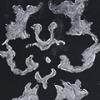
Clouds of Sils Maria
2014
Drama
2h 4m
A veteran stage star turns to her assistant for solace as she jousts with an arrogant younger actress. (TIFF)
Directed by:
Written by:
Genre:
Countries:
Languages:
Your probable score
?
Clouds of Sils Maria
2014
Drama
2h 4m
Your probable score
Avg Percentile 60.09% from 836 total ratings
Ratings & Reviews
(836)
Compact view
Compact view
Show
Sort
Rated 24 Aug 2014
7
57th
What stands out even more than the assured direction is Assayas' formidable screenplay, a challenging hybrid of complex characters and engaging interpersonal relationships. But the characters remain too encased in their worlds to allow for much in the way of emotional investment. Despite my reservation, there's a lot to admire here.
Rated 24 Aug 2014
Rated 02 May 2015
70
54th
There's a lot going on here including an excellent performance from Kristen Stewart. There's a lot of tension derived from not knowing when a character is reciting her lines from the play or from "real life". And it took a while to absorb the ending and finally realize this is about aging and the perpetual manipulation that goes on between generations which played out beautifully. My main criticism is that it bogs down at times. The clouds of the Maloja Snake are an impressive accent.
Rated 02 May 2015
Rated 12 May 2017
83
72nd
The heart of the film, an exploration on aging and self perception (particularly in women), is interesting to me and I found the layered nature of the discussions works well for exploring these ideas, and the setting allows for certain interactions that wouldn't be possible otherwise, with good back and forth dialogue and characters that are sympathetic but never emotionally charged so one can focus on the ideas and let the story flow as it will. Binoche stands out, Moretz too, Stewart is fine.
Rated 12 May 2017
Rated 20 Dec 2014
83
76th
A meta-drama that has a devastating personal conflict running through its narrative. Each interaction between Binoche and Stewart pulses with an electrical ambiguity, as fiction and reality collide as if two passing clouds become one.
Rated 20 Dec 2014
Rated 10 Aug 2015
85
79th
I love the way Assayas uses jump cuts to build momentum, especially on the train. Further, the report between the two leads is excellent. Binoche transforms through the course of the film, and brings a sense of increasing frailty to her role. And Stewart is something of a revelation. She successfully walks the fine line between seeming controlling and controlled. Assayas brings all of this together into an excellent meditation on aging, relationships, and accepting change.
Rated 10 Aug 2015
Rated 25 Feb 2021
68
47th
Hard to tell what the movie is about but Juliette Binoche and Kristen Stewart have an amazing chemistry in this one.
Rated 25 Feb 2021
Rated 15 Jan 2021
75
69th
A fiercely pretentious, academic maze of celebrity culture, high art vs. low art, and meta-commentary that I couldn't even begin to unravel in 500 characters. Lines of dialogue ricochet up and down between real-world context, the imaginary play (of which we only get small excerpts that must be reassembled from the analysis), and the actresses in between. Juliette Binoche cackling at the stupidity of superhero movies is how I'm trying to be in 2021.
Rated 15 Jan 2021
Rated 10 Apr 2015
90
97th
Clouds of Sils Maria is an excellent thinking-person's movie, filled with all sorts of subtle tensions and dramatic moments that will keep you engaged from start to finish thanks to slick direction, a strong script, and fantastic acting.
Rated 10 Apr 2015
Rated 25 Feb 2016
6
83rd
Don't get hung up on metaphors. Enjoy the virtuoso acting of Binoche and Stewart, and the strange and beautiful artwork Assayas has made of them pinballing around the notion of what it means to be a woman under a microscope.
Rated 25 Feb 2016
Rated 01 May 2015
90
80th
Something of a tour de force. Understated and complex, the film uses its three main actresses so perfectly, and they deliver wonderful performances. Tense and subdued, the film is deceptively simple, taking the audience to unexpected and exciting places.
Rated 01 May 2015
Rated 19 Apr 2015
20
52nd
Those rehearsal scenes were a wonder to behold.
Rated 19 Apr 2015
Rated 21 Feb 2015
71
66th
Well written and complex story, combination of real events and fiction, but somehow anemic and going nowhere output. Lots of beautiful environmental shooting.
Rated 21 Feb 2015
Rated 12 Oct 2018
60
39th
Good subject but the story or characters do not go anywhere! There are way better aging actress movies. Such as Sunset Blvd., Opening Night, All About Eve etc...
Rated 12 Oct 2018
Rated 22 Sep 2014
82
85th
Satisfyingly intellectual, and deliberately paced yet cheeky, Sils Maria elevates Assayas to an elite group of directors. It's not so much the performances or abundant dialogue which stand out; it's the metatextuality, the mind games that are played on us as the scenes flit between reality, performance and imagination. FWIW I thought Kristen Stewart acted best, and Binoche's turn was uneven (perhaps deliberately so) and so hard to judge her on. A thought-provoking work with beautiful scenery.
Rated 22 Sep 2014
Rated 27 Feb 2019
80
77th
Though some of the dialogue feels unnatural, Juliette Binoche and Kristen Stewart are both excellent in this brutally honest story, that is appreciable in how deliberate it is in its delivery.
Rated 27 Feb 2019
Rated 24 Jun 2015
74
69th
Kristen Stewart out-performs Juliette Binoche. These are surely the end times.
Rated 24 Jun 2015
Rated 10 May 2015
30
22nd
I like what Valentine says, though, about the text being like an object. Movies are a little like that, too. What one sees in Clouds of Sils Maria can be very dependent on where one stands. Some will see this as a profound and prickly rumination on age. Some will see an interesting character study, bolstered by terrific performances (including a surprising turn by Twilight veteran Kristen Stewart). But all will see same-sex attraction accompanied by profanity and nudity. (pluggedin.com)
Rated 10 May 2015
Rated 22 May 2015
78
74th
The kind of movie critics like because it's about the interpretation of a text, something they understand better than anyone. Everything we expect from Assayas is here in spades - flawless production design, elliptical storytelling, dated hipster rock, gorgeous European women - this time put to use exploring characters worthy of them, featuring a deservedly acclaimed performance from Kristen Stewart, and touching on themes of mediated reality and the solipsism of celebrity.
Rated 22 May 2015
Rated 18 Dec 2014
65
61st
If Assayas hasn't made Irma Vep... But he did, what makes this some sort of half-baked film about the artistic and relationship crisis that affect actors. Juliette can't overcome her memories and be the character she hated, as a Lindsay-Lohan-esque Chloe gets her role when she was young. In fact, Kristen and Juliette are already playing Wilhem's personas all the time, and their performances provide some hilarious scenes. A vacillating look on how acting is all about memory and zeitgeist.
Rated 18 Dec 2014
Rated 31 Mar 2017
3
38th
An occasionally very funny, typically thoughtful, and frankly somewhat dry treatment of the boundary between art and reality, the narcissism of artists, and the portentous seriousness with which everyone treats their work. (The real joke is that the play they're all working on reads like bad melodrama, only slightly less laughable than the superhero film the characters go to see.) The real allure is the relationship between the two leads, and the mystery in which it's eventually shrouded.
Rated 31 Mar 2017
Rated 08 Apr 2017
40
20th
Assayas you had so much to work with here and this is what you came up with? not good.
Rated 08 Apr 2017
Rated 27 May 2015
77
71st
"Clouds" tackles eerily similar themes to Baumbach's most recent film "While We're Young," but does so in a much more engaging and introspective manner.
Rated 27 May 2015
Rated 09 Feb 2015
70
69th
well, i think i'm not quite ready yet for this sort of relationship driven drama. that said, composition and characters, likeable or not, are very authentic. it's a glimpse into actors lives and how they struggle to distance themselves and the people surrounding them from their material. even more so, if it directly translates into their personal situation. who stood out to me was kristen stewart, she tied the movie together and her sudden disposal left an immediate emptiness. yes, in my pants.
Rated 09 Feb 2015
Rated 01 Sep 2015
68
67th
Smaller scale and on the surface at least simpler than Assayas' last few films, but at the same time his most complexly meta and intertextual. I can't say that it's one of my favorites of his (English language dialogue has never been one of his strong suits, and there's an oddly stilted quality to much of this) but it's a nice companion piece to Irma Vep at least, and even better a much-needed corrective to Birdman (smart yet pro-populist where that film was snobby and shallow at the same time).
Rated 01 Sep 2015
Rated 14 Jul 2018
54
21st
Not as clever as it thinks it is.
Rated 14 Jul 2018
Rated 14 Nov 2017
85
50th
Overestimated. Platitudes here and there. A great theme becomes vapid.
Rated 14 Nov 2017
Rated 08 May 2016
80
86th
It was certainly more "meta" than I thought it was going to be and it was fantastic for it. Reality v fiction is a constant theme in this film and it is balanced pretty well, with some fine performances. Kristen Stewart in particular was incredible (but maybe because it's compared to Twilight) and the film actually lacked a little bit when she was not on screen.
Rated 08 May 2016
Rated 13 Feb 2021
81
65th
Low-key two hander rests on Binoche and Stewart's first-rate, knowing performances, with a nice bit of passive-aggressive rancour from Moretz in support. The ambiguous character shake-up towards the end feels like Assayas not quite knowing how to finalise his story it makes no sense, and adds nothing much to the subtexts of any of the relationships. Still a beautifully shot and pensive character study, giving Binoche a chance to let it all hang out and have some fun.
Rated 13 Feb 2021
Rated 29 Jun 2018
84
94th
Beautiful and shocking and brilliant. So smart and so good.
Rated 29 Jun 2018
Rated 23 May 2020
65
47th
I would have preferred a lot less talking and a lot more Händel, but Assayas is pretty good at making films I don't like in ways that I can watch.
Rated 23 May 2020
Rated 11 Jan 2016
55
10th
Wow, this was fucking dull. This film has quite a lot of potential, though I feel it's lazily handled and is a thematically incoherent mess. I liked the modernity of the screenplay and how it comments on contemporary filmmaking (the scenes with CGM were all pretty fun), though not much is done with this sub-plot. There's also a forced conflict between Binoche and K-Stew, the latter character ends up going nowhere (literally). Digital cinematography also sucks, as does the awful editing.
Rated 11 Jan 2016
Rated 19 Dec 2014
70
56th
Well-written intense drama which is well connected with the setting it takes place, but its theme, the master-slave dialectics which stems from a playful use of theatre is a much repeated cliche. Although it doesn't leave a standing mark, it's worth watching just for Binochet's performance.
Rated 19 Dec 2014
Rated 15 Jan 2017
79
72nd
The perfomances, the images of clouds and the use of Pachabel's music conquered me.
Rated 15 Jan 2017
Rated 09 Nov 2019
55
36th
Well made but rather conventional film whose main point of interest is the relationships between different generations of women and how their value systems and life experiences both clash and converge. Binoche is predictably good as an aging actress struggling to come to terms with her increasing irrelevance, while Stewart is just OK as her assistant. Moretz's character is poorly judged though and is merely a caricature, and the conflicts play out in a rather benign fashion.
Rated 09 Nov 2019
Rated 31 Jul 2015
80
65th
Really good character-driven film. It's not as subtle as it maybe could be in making sure the clouds kind of represent the obscuring of reality, but it works. It's a tricky balance when a movie is so conversation based to avoid being to expository while also staying true to the characters. It mostly holds up.
Rated 31 Jul 2015
Rated 23 Jun 2016
63
82nd
#16#, exp3, rw3, story, ratings, actresses
Rated 23 Jun 2016
Rated 07 Nov 2015
50
13th
This score might not be correct because I stopped watching after 40 minutes. Then again, I rarely stop watching.
Rated 07 Nov 2015
Rated 08 Apr 2024
10
8th
Un gros navet pour intellectuels mal coiffés. Je me suis endormi au moins 10 fois, après je me suis réveillé, j'ai vu Juliette Binoche toute nue mais pas Kristen Stewart, j'ai tout de suite compris les ambitions du réalisateur.
Rated 08 Apr 2024
Rated 23 May 2016
74
84th
Ignoring some oddly terrible moments, such as the montage sequence when Stewart is driving by herself along a mountain road, this is a subtle and very interesting exploration of differences of epoch and between the generations. Binoche is probably the best actress currently working. Easily the best thing I've seen by this filmmaker.
Rated 23 May 2016
Rated 14 Feb 2019
92
95th
it's pretty fucking good. i felt so involved from the beginning. but maybe i didnt completely understood.
Rated 14 Feb 2019
Rated 23 Dec 2014
22
0th
This was one of the few films that made me fall asleep at the cinema. Oddly, I would like to see it again one day, because I feel like I might like it (at least a little bit) actually.
Rated 23 Dec 2014
Rated 22 Feb 2023
40
25th
“Synecdoche, NY — for Girls!” 80/100 up until the ending. What a stupid lack of ending. “Ohh it’s so meta! What does it mean??” It means Assayas was too lazy to finish the damned script. It means we get half a film. Gimmicky halfbaked pretentious postmodern arthouse Tiktok nonsense. Grow a pair & finish the script. Don’t mind a cliff-hanger, or a few less tied up ends than RotK but this is the most abrupt ending of a film I’ve seen. Thought it was a mistake. It was, but apparently on purpose.
Rated 22 Feb 2023
Rated 05 Sep 2014
80
54th
A funny and thought-provoking expose on Hollywood's treatment of middle-aged actresses, who are often shuffled out of the limelight for the next young star. Binoche is wonderful as an actress coming to terms with the forced shift in her career, and Kristen Stewart is the best I've ever seen her as a caring but frustrated assistant.
Rated 05 Sep 2014
Rated 22 May 2015
80
47th
Slow but very interesting. Story within a story. As I discussed it with people I began to like it more and more.
Rated 22 May 2015
Rated 14 Mar 2017
4
74th
The central theme is a familiar metatext on art as the looking glass, through which Assayas gazes into the gulf between perspectives of generation, the burdens of aging, and the personal baggage each of us unloads onto any subject. Elevated with psychological shade, aesthetic restraint, and a pair of intimate performances from Binoche and Stewart. It is casual, conversational, and a little bit prickly, not above poking fun at the vulgar displays of both popular and high cultures.
Rated 14 Mar 2017
Rated 25 Jul 2016
85
82nd
Really liked this one. Beautifully shot, fun and compelling story, strong characters & actors.
Rated 25 Jul 2016
Rated 26 Feb 2017
4
77th
Vackert foto, utmärkt skådespeleri och flerbottnad handling ger god underhållning. Mer tveksamt är väl om filmen har någon djupare livsvisdom att ge. Det är absolut ingen krav jag ställer i alla väder, men den tar sig själv ibland på ett allvar som gör att man lätt tror att det är manusförfattarens intention. Sammanfattningsvis klart sevärd (fyra utan tvekan).
Rated 26 Feb 2017
Rated 22 Apr 2021
80
72nd
A delicate but intoxicating examination of aging pride and perspective. If you've got an afternoon for a talky slow drama this is intelligently written and rewarding to chew on.
Rated 22 Apr 2021
Rated 08 Dec 2014
82
81st
Randevu İstanbul Film Festivali - Kanyon: Çok katmanlı ve kompleks yapısı, şık görüntüleri, sinema tarihinden tatlar barındırması ve çok iyi oyunculuklarıyla -evet, Binoche'unki kadar, Kristen Stewart'ın performansı da göz dolduruyor- tam bir sinefil filmi. "An instant classic" bitch!
Rated 08 Dec 2014
Rated 30 Jul 2018
83
86th
A fascinating character drama about an aging woman and her assistant in which life imitates art and art imitates life in more than one way.
Rated 30 Jul 2018
Rated 21 May 2015
7
73rd
Brilliant acting in this character driven, intense and very wordy drama which explores issues of aging and perspective.
Rated 21 May 2015
Rated 15 May 2015
72
29th
Maria (Juliette Binoche) is compelled to appear in a revival of the play which made her a star, this time in the role of an older woman manipulated by a younger co-worker while " her" role is to be played by a Hollywood starlet (Chloe Grace Moretz). Numerous debates with her assistant (Kristen Stewart) ensue. Sterling performances across the board and some sharp scenes make it watchable, but the play-within-the-film is hard to accept as a sensation, and the life/art parallels are pretty facile.
Rated 15 May 2015
Rated 23 Dec 2015
82
72nd
Wait, Kristen Stewart is holding her ground, even stealing scenes from Juliette Binoche. And when Stewart leaves, the movies looses his emotional core!? Is this Bizzaro world!? Beside that: Are they talking about themselves while they are rehearsing? Then, I think its a little bit to simple. And the Binoche-character is way to ignorant to pull me in. Or is there more, I'm not smart enough to witness? All those smart people involved in this, make me doubt my potential ignorance.
Rated 23 Dec 2015
Rated 28 Apr 2017
16
2nd
burjuva bunalımlarını anlatan rezalet bir film. nasıl cannes seçkisine girdi anlamadım.
Rated 28 Apr 2017
Rated 08 Mar 2017
83
82nd
Without flair or fuss, Clouds of Sils Maria floats in and gives a lesson on time and the fear of fading self importance with such heft and honesty. The dialogue rings so true as Binoche and Stewart ooze the chemistry that is so familiar with people that have known each other for years. Everything just seems so effortless while saying so much. Beautifully done.
Rated 08 Mar 2017
Rated 18 Aug 2019
67
31st
(I couldn't shake the feeling I wasn't getting paid enough to endure this. Cassavetes/Rowland trod the fuck out of this already, no?)
Rated 18 Aug 2019
Cast & Info
Directed by:
Written by:
Genre:
Countries:
Languages:
Collections
Loading ...
Similar Titles
Loading ...
Statistics
Loading ...
Trailer
Loading ...
PSI
?


























































